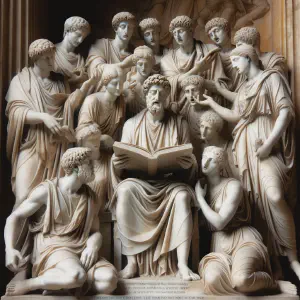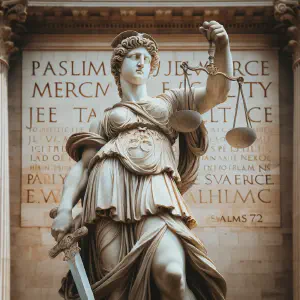The Dawn of Righteous Reign



Joseph awoke from his dream, a man transformed by divine purpose. He took Mary into his home, a silent guardian of a mystery that would change the course of history. In time, Mary bore a son, and Joseph, as instructed, named him Jesus. In this humble birth, the words of prophets and the hopes of generations converged. Emmanuel, “God with us,” had come, inaugurating an era of justice and peace, the fulfillment of a divine promise that had echoed through the ages.
Five Questions
What does the prophecy in Jeremiah about a “righteous shoot to David” signify?
This prophecy signifies the coming of a new ruler in the lineage of David, who would embody righteousness and justice. It’s a messianic prophecy, pointing towards the coming of Jesus Christ, who fulfills this role by establishing a new kingdom based not on political power, but on spiritual and moral righteousness.
How does Psalm 72 complement the message in Jeremiah?
Psalm 72 paints a picture of an ideal king, one who judges with righteousness and justice, particularly favoring the poor and the oppressed. This Psalm complements Jeremiah’s prophecy by further describing the qualities of this coming king, and it aligns closely with the teachings and actions of Jesus, especially his concern for the marginalized in society.
In the Gospel of Matthew, why is Joseph’s reaction to Mary’s pregnancy significant?
Joseph’s reaction is significant because it demonstrates his righteousness and compassion. Faced with what he initially thought was Mary’s infidelity, he chose to act with kindness, planning to divorce her quietly to avoid public shame. His obedience to the angel’s message later shows his deep faith and willingness to participate in God’s plan, even when it defied social norms and his own expectations.
What is the importance of the name “Emmanuel” given to Jesus?
The name “Emmanuel,” meaning “God is with us,” emphasizes the incarnation of God in Jesus Christ. It signifies that through Jesus, God entered human history in a tangible way, offering a direct connection and presence with His people. This name encapsulates the essence of the Christian faith - God becoming human to save humanity.
How do these scriptures collectively convey the theme of hope and salvation?
These scriptures collectively convey hope and salvation by linking the Old Testament prophecies with their fulfillment in the New Testament. The prophecy in Jeremiah and the vision in Psalm 72 set a framework of expectation for a savior, which is realized in the Gospel of Matthew through Jesus Christ. This narrative arc from prophecy to fulfillment reinforces the Christian belief in a loving, redemptive God who actively intervenes in human history for the salvation of His people.
Bible Study
Jeremiah 23:5-8
Behold, the days are coming, says the LORD,
when I will raise up a righteous shoot to David;
As king he shall reign and govern wisely,
he shall do what is just and right in the land.
In his days Judah shall be saved,
Israel shall dwell in security.
This is the name they give him:
“The LORD our justice.”
Therefore, the days will come, says the LORD,
when they shall no longer say, “As the LORD lives,
who brought the children of Israel out of the land of Egypt”;
but rather, “As the LORD lives,
who brought the descendants of the house of Israel
up from the land of the north”–
and from all the lands to which I banished them;
they shall again live on their own land.
In this passage, the prophet Jeremiah speaks of a future king, a ‘righteous shoot to David,’ who will reign with justice and wisdom. This king, later understood as Jesus Christ, fulfills the role of bringing salvation and security to Israel and Judah. Jeremiah, a major prophet in the Old Testament, often conveyed messages of hope and restoration alongside warnings. This prophecy aligns with Catholic values of hope and justice, resonating with the concept of divine providence and the anticipation of Christ’s redemptive role, as outlined in the Catechism of the Catholic Church.
Psalm 72:1-2, 12-13, 18-19
R. (see 7) Justice shall flourish in his time, and fullness of peace for ever.
O God, with your judgment endow the king,
and with your justice, the king’s son;
He shall govern your people with justice
and your afflicted ones with judgment.
R. Justice shall flourish in his time, and fullness of peace for ever.
For he shall rescue the poor when he cries out,
and the afflicted when he has no one to help him.
He shall have pity for the lowly and the poor;
the lives of the poor he shall save.
R. Justice shall flourish in his time, and fullness of peace for ever.
Blessed be the LORD, the God of Israel,
who alone does wondrous deeds.
And blessed forever be his glorious name;
may the whole earth be filled with his glory.
R. Justice shall flourish in his time, and fullness of peace for ever.
Psalm 72 is attributed to King Solomon, a figure renowned for his wisdom. This Psalm is a prayer for the king, asking God to endow him with justice and righteousness, emphasizing the king’s role in defending the poor and oppressed. It reflects Catholic social teaching on the dignity of every person and the preferential option for the poor. The psalm’s plea for justice and peace echoes the Beatitudes and the Corporal Acts of Mercy, which are central to Catholic ethics and morality.
Matthew 1:18-25
This is how the birth of Jesus Christ came about.
When his mother Mary was betrothed to Joseph,
but before they lived together,
she was found with child through the Holy Spirit.
Joseph her husband, since he was a righteous man,
yet unwilling to expose her to shame,
decided to divorce her quietly.
Such was his intention when, behold,
the angel of the Lord appeared to him in a dream and said,
“Joseph, son of David,
do not be afraid to take Mary your wife into your home.
For it is through the Holy Spirit
that this child has been conceived in her.
She will bear a son and you are to name him Jesus,
because he will save his people from their sins.”
All this took place to fulfill
what the Lord had said through the prophet:
Behold, the virgin shall be with child and bear a son,
and they shall name him Emmanuel,
which means “God is with us.”
When Joseph awoke,
he did as the angel of the Lord had commanded him
and took his wife into his home.
He had no relations with her until she bore a son,
and he named him Jesus.
This passage from Matthew’s Gospel narrates the birth of Jesus Christ, emphasizing His divine conception through the Holy Spirit. Mary, a young virgin, and Joseph, a carpenter and descendant of David, are central figures. Joseph’s decision to accept Mary and the unborn Jesus despite societal norms demonstrates obedience and faith, aligning with Catholic teachings on the sanctity of family, marriage, and the divine plan of God. The passage highlights the fulfillment of Old Testament prophecies and the introduction of grace through Christ, a core aspect of Catholic soteriology.
Lessons
These sacred readings illuminate the profound mysteries of faith and the fulfillment of God’s promises. In Jeremiah, we see the prophecy of a righteous king, a descendant of David, who will bring justice and salvation. The Psalm echoes this theme, praising the Lord for His wondrous deeds and envisioning a time of justice and peace. The Gospel of Matthew brings these prophecies to fruition in the humble yet miraculous birth of Jesus Christ, conceived by the Holy Spirit. Through Joseph’s faithful obedience and Mary’s humble acceptance, we learn the virtues of trust in God’s plan and the transformative power of divine intervention. These passages remind us of the enduring hope and salvation offered through Christ, encouraging us to live with faith and justice in our hearts.
Meditation Prayer


